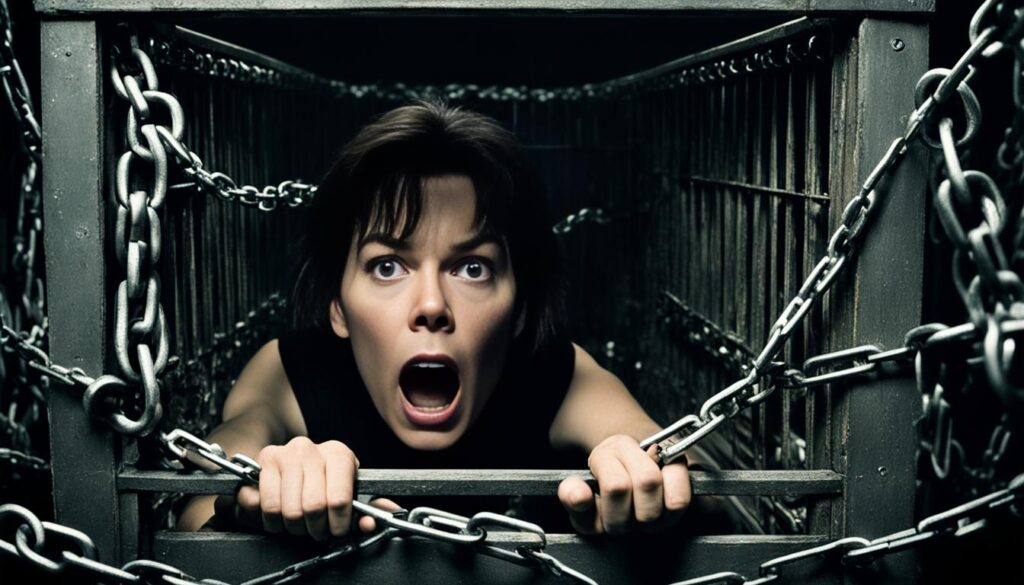Stephen King is a household name in the world of horror literature, and for a good reason. His stories have the power to captivate and terrify readers in equal measure. One such tale that has become synonymous with spine-tingling suspense is “The Crate by Stephen King.”
This terrifying story takes readers on a journey into the unknown, exploring our deepest fears and the horrors that can exist within a familiar setting. From its characters to its setting, “The Crate” is a masterclass in storytelling that delivers on its promise of suspense and fear.
In this article, we will take a closer look at the story, its themes, and its impact on the horror genre. Join us as we delve into the twisted mind of one of the most influential authors of our time and explore the legacy of Stephen King.
Overview of “The Crate” Short Story
In “The Crate” short story by Stephen King, a mysterious crate is discovered beneath a set of stairs at a university. The story takes place in the late 1970s and follows the lives of Henry, a professor, and his wife Wilma, who become embroiled in a horrifying tale of terror that the crate unleashes. As they attempt to rid themselves of the deadly contents, they soon realize that the crate’s true origins and power are far more sinister than they could have ever imagined. “The Crate” short story is a thrilling and suspenseful read, and it sets the tone for the horror genre that Stephen King is so well known for.
Themes and Analysis in “The Crate”
In “The Crate,” Stephen King masterfully explores various themes that contribute to the story’s eerie tone and create a sense of impending doom. One of the predominant themes is fear. The story’s characters are consumed by fear and paranoia, both of the unknown and of their own actions. This fear is not only present in the present time but is also rooted in their past. The trauma of past events continues to haunt them, leading to actions that have disastrous consequences.
The theme of isolation is also prevalent in the story. The characters feel cut off from the rest of the world, both physically and emotionally. This isolation is particularly evident in the relationship between the protagonist, Henry, and his wife, Wilma. Their marriage is strained, and they seem to occupy different emotional worlds entirely. This emotional estrangement is further compounded by the physical environment in which the story takes place—a dark and isolated college campus that only adds to the sense of foreboding.
One of the most significant themes in “The Crate” is the power of the unknown. Throughout the story, the characters are grappling with an unnamed, unseen force that is beyond their comprehension. This power has the ability to evoke intense feelings of fear, uncertainty, and panic, causing the characters to doubt themselves and others around them. King masterfully exploits this fear of the unknown, leaving readers on the edge of their seats as they try to unravel the mystery before them.
Overall, Stephen King’s storytelling acumen is on full display in “The Crate.” Through the themes of fear, isolation, and the unknown, he creates a captivating narrative that continues to enthrall readers decades after its publication.

Impact of “The Crate” on Horror Genre
Stephen King’s “The Crate” has had a profound impact on the horror genre since its publication in 1979. Not only did the story utilize innovative and terrifying narrative techniques, but it also influenced numerous other writers and filmmakers working in the genre.
The story’s use of suspense and fear, expertly crafted characters, and setting contributed to its enduring popularity and ability to capture readers’ imaginations. Moreover, “The Crate” has had a significant impact on readers’ perception of horror by pushing the limits of the genre, paving the way for similarly innovative works by other artists.
Influence on Other Works
In addition to its impact on readers, Stephen King’s “The Crate” has influenced countless other writers and filmmakers within the horror genre. Its unapologetically gruesome and haunting style has been emulated in works ranging from “The Walking Dead” to “Silence of the Lambs,” and its influence can be felt throughout modern horror storytelling.
Stephen King’s Legacy
Stephen King is widely regarded as one of the most influential authors of our time. His storytelling prowess has had a profound impact on popular culture, and his works continue to captivate readers all over the world.
With over 60 novels and 200 short stories to his name, King’s body of work is a testament to his skill as a writer. His ability to create well-rounded characters, build suspenseful plots, and explore complex themes has earned him a loyal following of readers and established him as an icon in the horror genre.
King’s influence extends beyond the literary world. His works have been adapted into numerous films, television shows, and other media, making him a fixture of popular culture. From “Carrie” to “IT” to “The Shining,” King’s stories have become a staple of horror cinema, inspiring countless filmmakers and actors.
Furthermore, King has been a vocal advocate for aspiring writers, offering advice and encouragement to those hoping to follow in his footsteps. His memoir, “On Writing,” has become a must-read for anyone interested in the craft of writing and has helped inspire a new generation of storytellers.
Overall, Stephen King’s legacy is as immense as it is enduring. His contribution to the horror genre and popular culture as a whole is immeasurable, and his influence will continue to be felt for generations to come.



